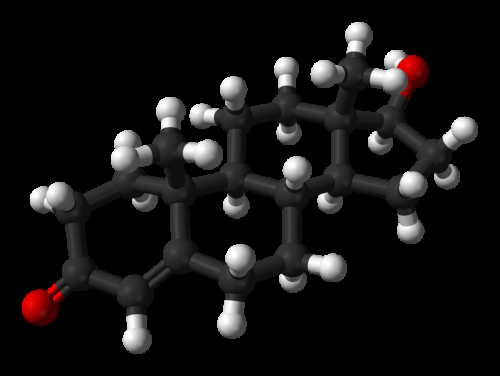Ball-and-stick model of the testosterone molecule, C19H28O2, as found in the crystal structure of testosterone monohydrate. Credit: Ben Mills/Wikipedia
Men's susceptibility to serious health conditions may be influenced by low exposure to testosterone in the womb, new research suggests.
A study has revealed how men's testosterone levels may be determined before they are born.
Understanding why some men have less of the hormone than others is important because testosterone is crucial for life-long health. Low levels of the hormone have been linked to obesity, diabetes and heart disease.
Researchers have shown that the cells responsible for producing testosterone in adults – known as Leydig cells – are derived from a specific population of stem cells found in the testes.
The team found evidence of these stem cells in the developing testes of babies, rats, mice and marmosets in the womb.
Leydig cells do not develop until puberty but the team showed that their function is impaired if their stem cell forefathers are exposed to reduced levels of testosterone in the womb.
The study is the first to provide evidence of how events in the womb could influence male health in later life. It was led by scientists from the Medical Research Council (MRC) Centre for Reproductive Health at the University of Edinburgh.
Professor Richard Sharpe said: "There is increasing evidence that a mother's diet, lifestyle and exposure to drugs and chemicals can have a significant impact on testosterone levels in the womb. We need a better grasp of these factors so that we can give reliable advice to pregnant women to protect the health of her unborn child."
The study is published in the journal Proceedings of the National Academy of Sciences (PNAS).
More information: K.R Kilcoyne et al. Fetal programming of adult Leydig cell function by androgenic effects on stem/ progenitor cells. Proceedings of the National Academy of Sciences, 21 April 2014. www.pnas.org/content/early/201 … /1320735111.abstract
Journal information: Proceedings of the National Academy of Sciences
Provided by University of Edinburgh



















